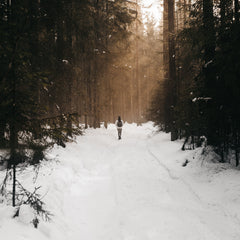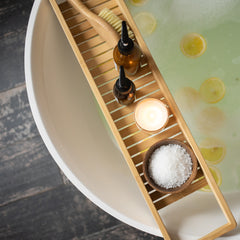Natural Mosquito Protection: Against a Growing Risk in Germany
Starting in summer and continuing into autumn mosquitos are a part of our lives. They are generally most active at dawn and dusk, and fly around aimlessly searching for the smell of a target. Once they smell what they are looking for, they fly directly to it - and bite.
Mosquitoes have a finely tuned sense of smell that leads them directly to animals with blood. The smell of exhaled carbon dioxide, as well as chemicals released in sweat, leads them directly to their target. They extract the blood mostly for the proteins that are needed for egg production. Humans aren’t the only targets - mosquitoes extract blood from birds, as well as snakes, lizards, frogs and some fish.
Worldwide, due to the amount of disease that is transmitted, mosquitos are responsible for the most deaths of any other animal - primarily due to the spread of malaria (1).
Since Malaria was eradicated in Europe in the late 1970’s (2), Europe has been largely free of mosquito-borne diseases. However, mostly due to transport routes associated with globalisation, and to a certain extent climate change (3) mosquitoes are spreading away from their natural habitats into other areas.
Germany is home to around 50 of the 3600 known species of mosquito worldwide. Five invasive species have also been found since 2004, including the Asian tiger mosquito, Asian bush mosquito and Korean bush mosquito (4).
Some current and future risks in Germany:
West Nile Virus
-
First ever case of West Nile virus in Germany was recorded in 2018.
-
In 2019 in Germany the first local transmission of the virus via mosquito was recorded (5)
-
In 2019 (the latest reported numbers) there were 5 human cases in Germany.
-
The primary hosts are birds.
Usutu Virus
-
First detected in Germany in birds in 2010.
-
So far no confirmed human cases, although this is a current risk.
-
Birds are the primary host.
-
The virus has been the cause of multiple mass-death events of birds in Germany (6).
Dengue Fever
-
Dengue fever is the most common mosquito-borne viral disease in the world.
-
There are up to 600 cases of Dengue Fever reported in Germany per year, however all cases until now have been a result of bites received abroad (7).
-
In Europe, mostly in France, imported Dengue Fever has resulted in local transmission of the virus (8), which could also eventually happen in Germany.
-
International Anti-Dengue Day is observed every year on June 15th.
-
The primary hosts are humans.
Chikungunya
-
In 2020 (the latest reported numbers) there were 26 cases in Germany (9), however all cases until now have been a result of bites received abroad.
-
In Europe, mostly in France and Italy, imported Chikungunya has resulted in local transmission of the virus (10), which could also eventually happen in Germany.
Mosquito Atlas
An initiative involving citizens, called the Mosquito Atlas, was created in 2012 in an effort to analyse local mosquito species and any diseases that they may carry within Germany. Citizens are called on to trap mosquitoes, most easily done in their homes, and to send them to the project scientists for analysis. The results are sent back to each ‘mosquito hunter’ personally, and the submission is also entered onto a map on their website - the mosquito atlas - with the mosquito hunter’s permission. By asking citizens to send in their mosquitos, this enables the scientists to receive submissions continually from all around the county. Submissions help the scientists to keep a current accurate picture of mosquito populations, and allows for a quick response if diseases are found.
Methods to Repel
It is recommended to repel mosquitos, instead of trying to kill them with pesticides. Pesticides are incredibly destructive to our environment, and not only kill vast amounts of the targeted insect, but also kill vast amounts of all insects, which are needed for the food chain and pollination. Pesticides also build up in waterways and can poison everything from small invertebrates to fish and mammals. The world is currently feeling the effects of decades of overuse of pesticides in agriculture, which has resulted in unbalanced ecosystems with very few insects as a food-source for other animals, as well as aquatic dead-zones.
Here are a few ways that you can repel mosquitoes effectively:
-
Cover up your body’s smell - mosquitoes are attracted to exhaled carbon dioxide and components of sweat. An effective way to avoid being bitten is to cover your body’s smell. Effective scents are lavender, lemon eucalyptus, and cedar essential oils. Lemon eucalyptus oil has been found to be as effective as the chemical DEET at repelling mosquitos (11). Be careful about putting essential oils directly onto your skin. Essential oils are very concentrated plant oils, and could cause a rash. Mix essential oils with water in a spray bottle, and spray on your skin. Do a test on a small area of skin, and wait around 1 hour, to see if your skin reacts.
-
Chemical repellents - DEET and Picaridin are very effective at repelling mosquitoes. They can however be toxic to insects and there are some human health concerns. While I would not like to recommend using chemicals, I would much prefer limited use of a chemical repellent instead of a tropical disease outbreak in Germany. A good natural alternative, which has been shown to be as effective as DEET, is lemon eucalyptus oil (11).
-
Drain standing water - drain any areas on your property where water collects. This will reduce the amount of places where mosquitoes can lay their eggs. While this will most likely not completely eliminate mosquitoes in your area, it can help to control the population.
-
Long clothing - At dawn and dusk be sure to wear long clothing to avoid being bitten.
-
Mosquito netting - Use netting on your windows and doors. This is becoming increasingly common in Europe.
What should you do if you get bitten?
Firstly, remain calm. The risk of getting a mosquito-borne disease in Germany is currently low. If you start to feel sick, especially within the next two weeks, you should visit a doctor.
When a mosquito bites, it sucks out blood while injecting some of their saliva. Their saliva contains anticoagulants and proteins. The proteins are foreign substances in your body which trigger an immune reaction. Histamine is released by your body which causes the swelling and itchiness.
You can help reduce the itchiness of a mosquito bite by cooling the affected area, the easiest way being with an ice cube or an ice pack. Do not scratch the mosquito bite, this can cause your body to react more strongly, and will only increase the itchiness. If your body reacts any more severely than mild itching, consult a doctor immediately.
Do we really need mosquitoes?
While mosquitoes are annoying and even dangerous for humans, they are also an integral part of most ecosystems. The larvae, which develop in standing water, are an important food source for fish. Adult mosquitoes are eaten by bats, birds, and spiders. It is however currently being analysed and debated within the scientific community what impact eliminating mosquitoes from our environment would have. It is theorised that nature would adapt to a lack of mosquitoes, and that other food sources would be found (12).
Sources:
- https://web.archive.org/
- https://www.sciencedirect.com/
- https://www.ncbi.nlm.nih.gov
- https://link.springer.com/
- https://www.ecdc.europa.eu/
- https://www.nature.com/
- https://www.fraunhofer.de/
- https://www.ecdc.europa.eu/
- https://www.ecdc.europa.eu/
- https://www.ecdc.europa.eu/
- https://www.webmd.com/
- https://www.nature.com/





Leave a comment
Please note, comments must be approved before they are published